Natural Law and the American Founding

Natural law maintains that human conduct is subject to eternal and unchanging moral laws. These moral laws originate, not in human legislation, but in nature or a divine lawgiver. These moral laws govern all people, at all times, and in all circumstances. These moral laws are unwritten, but man can discover their content by intuition, careful reason, or divine revelation. Human happiness depends on obeying these moral laws and pursuing justice.
This is a preview of subscription content, log in via an institution to check access.
Access this chapter
Subscribe and save
Springer+ Basic
€32.70 /Month
- Get 10 units per month
- Download Article/Chapter or eBook
- 1 Unit = 1 Article or 1 Chapter
- Cancel anytime
Buy Now
Price includes VAT (France)
eBook EUR 192.59 Price includes VAT (France)
Hardcover Book EUR 242.64 Price includes VAT (France)
Tax calculation will be finalised at checkout
Purchases are for personal use only
Further Reading
- Berman, H. 1983. Law and Revolution: The Formation of the Western Legal Tradition. Cambridge: Harvard University Press. This work explains the six legal revolutions since medieval times that formed the Western legal tradition. Google Scholar
- ———. 2003. Law and Revolution, II: The Impact of the Protestant Reformations on the Western Legal Tradition. Cambridge: Harvard University Press. This work explains the impact of the Protestant Reformations on the Western legal tradition. Google Scholar
- Rommen, H. 1998. The Natural Law: A Study in Legal and Social History and Philosophy. Indianapolis: Liberty Fund). Rommen traces the natural law tradition from the legacies of Greek and Roman thought to the displacement of natural law theory by legal positivism in the 20th century. The work concludes with the re-emergence of natural law thought in the Western legal tradition. Google Scholar
References
- Aristotle. 1943. The Politics of Aristotle. New York: Random House. Google Scholar
- ———. 1985. Nicomachean Ethics. Indianapolis: Hackett. Google Scholar
- ———. 2005. Poetics and Rhetoric. New York: Barnes and Noble. Google Scholar
- Blackstone. 2016. Commentaries on the Laws of England. Vol. 1. Oxford: Oxford University Press. Google Scholar
- Cicero. 2008. The Republic and The Laws. Oxford: Oxford University Press. Google Scholar
- Hobbes, T. 2004. Leviathan. New York: Barnes and Noble. Google Scholar
- Jefferson, T. 1904. Declaration of Independence. In The Works of Thomas Jefferson in Twelve Volumes, ed. P. Ford, vol. 2. New York: Putnam. Google Scholar
- ———. 2002. Virginia Statute for Religious Freedom. In The American Republic: Primary Sources, ed. B. Frohnen. Liberty Fund: Indianapolis. Google Scholar
- Justinian. 1987. Justinian’s Institutes. Ithaca, NY: Cornell University Press. Google Scholar
- ———. 1998. The Digest of Justinian. Philadelphia: University of Pennsylvania Press. Google Scholar
- Locke, J. 1824. The Reasonableness of Christianity. In The Works of John Locke in Nine Volumes, vol. 7. London: Baldwin. Google Scholar
- ———. 1988. Two Treatises of Government. Cambridge: Cambridge University Press. BookGoogle Scholar
- ———. 2002. The Second Treatise of Government and A Letter concerning Toleration. Mineola: Dover. Google Scholar
- ———. 2004. An Essay concerning Human Understanding. New York: Barnes and Noble. Google Scholar
- Madison, J. 1983. Memorial and Remonstrance against Religious Assessments. In American Political Writing during the Founding Era, 1760–1805, ed. C. Hyneman and D. Lutz, vol. 1. Liberty Fund: Indianapolis. Google Scholar
- Plato. 1961a. Crito. In Plato: The Collected Dialogues, ed. E. Hamilton and H. Cairns. Princeton University Press: Princeton. Google Scholar
- ———. 1961b. Letter VII. In Plato: The Collected Dialogues, ed. E. Hamilton and H. Cairns. Princeton University Press: Princeton. Google Scholar
Author information
Authors and Affiliations
- Houston Christian University, Houston, TX, USA John O. Tyler
- John O. Tyler

